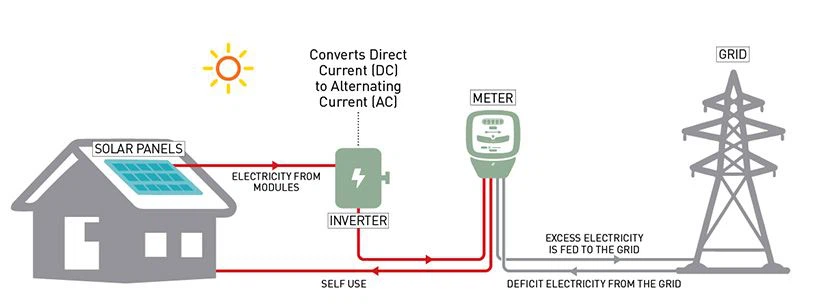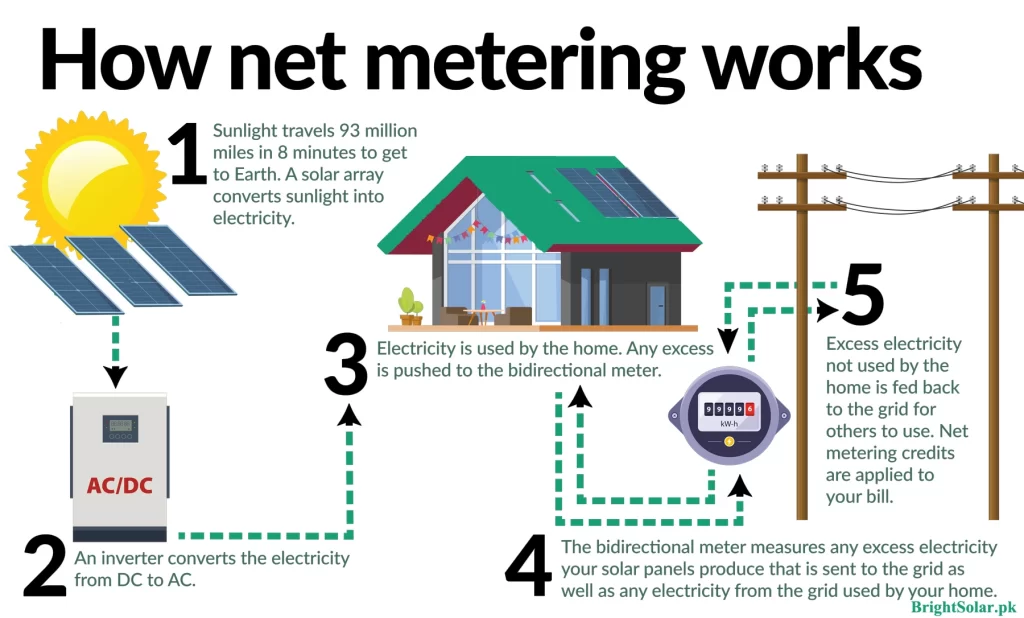Last updated on January 4th, 2025 at 12:07 am
When considering solar energy systems for your home or business in Pakistan, it’s crucial to understand the concept of net metering. Net metering in Pakistan policies or agreements dictates how customers are billed and credited for power in a solar setup.
Solar panels installed on your roof harness sunlight to generate electricity for your home and business. The peak generation occurs during the optimal sun hours, typically within 4-8 hours when the panels receive direct sunlight. The duration of these peak sun hours varies depending on factors like weather conditions and geographical location.
In practice, households often don’t fully utilize all the energy generated during these peak hours. Energy needs fluctuate, sometimes exceeding or falling short of what the solar panels produce in a day. Moreover, solar panels remain inactive during nighttime when energy is still required for home use.
A net meter connection provides a solution to these power challenges associated with home solar systems. Net metering allows you to balance the excess energy generated during peak hours by feeding it back to the grid, earning credits. These credits can then be utilized during periods of low or no solar generation, ensuring a more efficient and cost-effective utilization of solar power for your home.
What Is Net Metering?
Net Energy Metering (NEM), commonly known as solar net metering, is a metering and billing system designed to monitor and record the exchange of power between a solar energy system and the government grid. Solar meters or green meters play a vital role in the configuration of privately owned grid-tied solar energy systems.
In a solar net metering setup, surplus power generated by the solar arrangement can be sent back to the grid, preventing the wastage of unused energy. This system proves to be a cost-effective alternative to off-grid solar systems that rely on expensive solar batteries for energy storage.
The net metering concept offers significant benefits for residential solar owners. Those with excess solar electricity receive energy credits for transferring it to the grid. These credits can then be utilized when their energy demand surpasses what the solar panels can provide. This arrangement not only encourages sustainable energy practices but also provides an economical solution for homeowners looking to maximize the efficiency of their solar systems.
How Does a Net Metering Solar System Work?

A solar power system is connected to a utility grid through a green meter and the main service panel or circuit. When the solar panels generate more power than is needed on-site, the power meter redirects the excess solar energy to the grid. During this process, the meter reverses its usual direction. Therefore, a bidirectional meter for solar is essential to facilitate the net metering system in Pakistan.
In a bidirectional meter system, the meter operates in both directions, measuring the export and import of power. It quantifies the units of grid electricity purchased when the on-site power demand exceeds the solar energy output. Simultaneously, it measures the transfer of surplus electricity to the grid. In the latter scenario, the electric meter runs backward, potentially offsetting your grid withdrawals and contributing to a more efficient and cost-effective use of solar energy.
Method of Billing
In a net metering system, the customer reconciles the net inflow and outflow transactions, resulting in a potentially lower or negligible electric bill if grid exports exceed imports.
For instance, if the rate of electricity exported to the grid during the day is Rs. 1000, and the rate for electricity imported from the grid at night is Rs. 1120, the net bill for the day would be Rs. 20. Explore the Net Metering Rates In Pakistan to get updated information.
With a net metering solar system, you receive credits for every unit of solar electricity transferred to the grid. During periods of reduced or zero solar generation, you can utilize these banked solar credits to offset your grid withdrawals. The bidirectional electric meter accurately records this energy exchange each month.
It’s crucial to note that net metering regulations vary among states, and consumers are advised to contact their local company for comprehensive details. This includes information on the net metering application process, tariff rates for exports and imports, and the type of net meter to be installed.
The Benefit of Net Metering System
- Cost Reduction for Solar Systems:
- The net metering policy reduces the overall cost of solar systems by eliminating the need for expensive solar batteries for power storage. This affordability encourages the adoption of sustainable energy among residential and commercial consumers.
- Financial Rewards and Savings:
- Solar metering amplifies savings on monthly utility bills, turning solar credits into a passive income source. Consumers can purchase grid electricity when needed, and these financial rewards continue for the entire lifespan of a rooftop solar system (typically 25 years).
- Low Maintenance Costs:
- Unlike solar batteries, which may incur high maintenance and replacement costs, a net metering system is a cost-effective option with lower maintenance requirements.
- Social Contribution:
- The adoption of net metering benefits the grid by reducing the dependence on centralized power sources. As more customers embrace distributed solar power systems, the grid becomes more reliable and resilient. This helps alleviate issues such as transmission losses, outages, and congestion.
- Environmental Benefits:
- Net metering promotes significant environmental advantages. By displacing electricity generated through conventional sources, such as natural gas or coal plants, solar energy reduces greenhouse gas emissions and air pollution. Consumers contribute to environmental sustainability by transferring excess solar power to the grid via net metering.
How to Apply for Net Metering in Pakistan
In Pakistan, the net metering process is governed by the NEPRA 2015 regulation. It’s crucial to note that individuals cannot directly apply for net metering. Instead, they must engage with an AEDB (Alternative Energy Development Board) registered solar company to access the net metering facility. Check out our here complete guide of how to apply for net metering in Pakistan.




